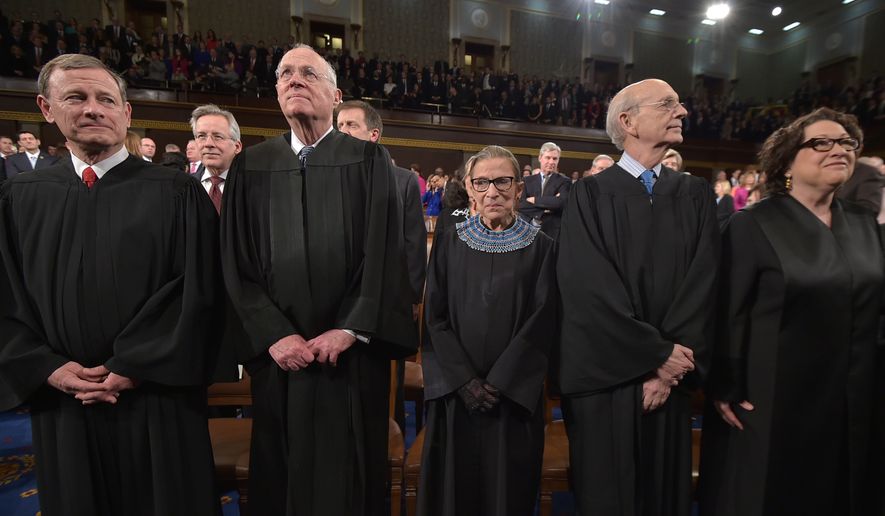The Supreme Court ruled Monday that states can use independent commissions to redraw their congressional districts, turning away a challenge by Arizona lawmakers who said the Constitution clearly vested that power in state legislatures alone.
In a 5-4 decision, the court said the definition of “legislature” could reasonably extend to voter-approved measures such as the one Arizona enacted in 2000 to have a five-member commission instead of state lawmakers draw the lines.
The referendum was an attempt to erase partisan gerrymandering, in which the dominant party manipulates district boundaries — sometimes in a tortured way — to solidify its grip on certain House seats.
State Republicans filed suit after the latest round of redistricting, saying the switch was unconstitutional and unwisely empowered an unelected board.
Justice Ruth Bader Ginsburg, writing for the court, said the lawmakers had legal standing to sue. She also acknowledged that the Founding Fathers may not have envisioned a system that allows voters to weigh in on issues directly.
“But the invention of the initiative was in full harmony with the Constitution’s conception of the people as the font of governmental power,” she wrote, joined by the other members of the court’s liberal wing and Justice Anthony M. Kennedy, a key swing vote.
Congressional Democrats hailed the ruling as a win for everyday people over partisan politics.
“Elections are not games for politicians to rig, and this court decision makes clear that public officials cannot trump the will of the people in an attempt to stack the electoral map in their favor,” said Rep. Raul M. Grijalva, Arizona Democrat.
Chief Justice John G. Roberts Jr. led the court’s conservative wing in dissent, saying there was no way the court could interpret “the legislature” to simply mean “the people,” while Arizona Republicans said the ruling ignored the “clear language” of the Constitution.
“The Framers selected the elected representatives of the people to conduct congressional redistricting. It’s unfortunate that the clear constitutional design has been demolished in Arizona by five lawyers at the high court,” House Majority Leader David Gowan said in a joint statement with Senate President Andy Biggs.
The ruling effectively protects commissions in other states, including populous California, where voters approved a 2008 referendum to hand over redistricting to a 14-member board.
Commissions have the primary responsibility to redraw district boundaries in 11 additional states, while three states use advisory commissions and five others have backup commissions that can step in if lawmakers fail to approve their plans on time, according to the National Conference of State Legislatures.
The case before the justices kicked off in 2012 after the Arizona Independent Redistricting Commission approved a district map to account for population growth in the 2010 census.
Republicans said the commission — made up two Republican appointees, two Democratic appointees and a fifth member chosen by both parties — had skewed the lines in favor of Democrats. In their lawsuit, they said the referendum that stripped them of their district-shaping authority violated the elections clause of the Constitution.
Justice Ginsburg, though, said precluding Arizona voters from making the switch would “run up against the Constitution’s animating principle that the people themselves are the originating source of all the powers of government.”
In dissent, Chief Justice Roberts evoked the hard-fought campaign for the 17th Amendment, which allowed voters select their U.S. senators directly instead of leaving it up to state legislatures.
“What chumps! Didn’t they realize that all they had to do was interpret the constitutional term ’the legislature’ to mean ’the people?’” the chief justice wrote, joined by Justices Antonin Scalia, Clarence Thomas and Samuel A. Alito Jr.
Justice Scalia said the court lacked jurisdiction to even hear the case.
Nonetheless, he said, the majority’s holding is “so outrageously wrong” that he felt compelled to add his name to Chief Justice Roberts’ dissent.
• Tom Howell Jr. can be reached at thowell@washingtontimes.com.




Please read our comment policy before commenting.